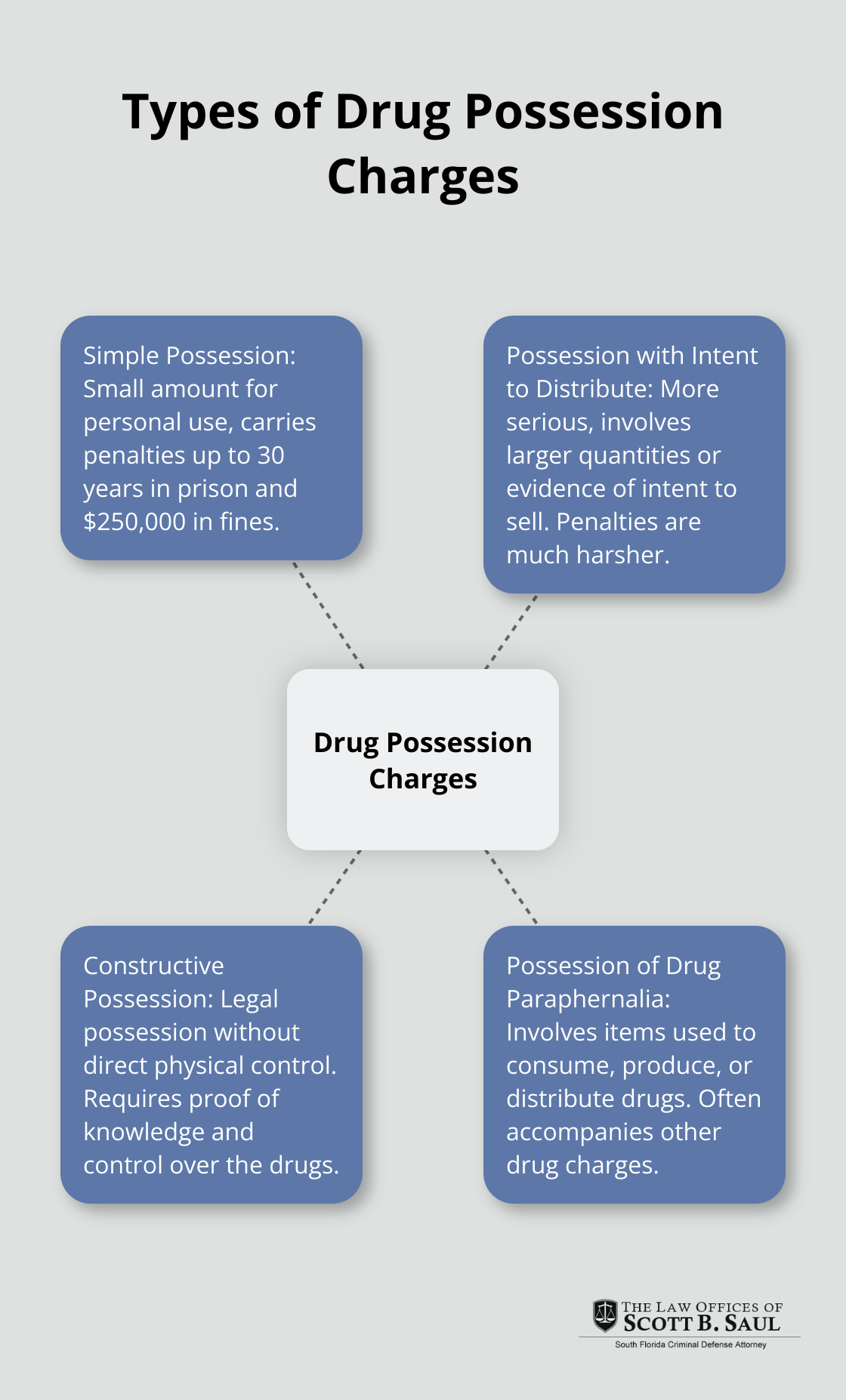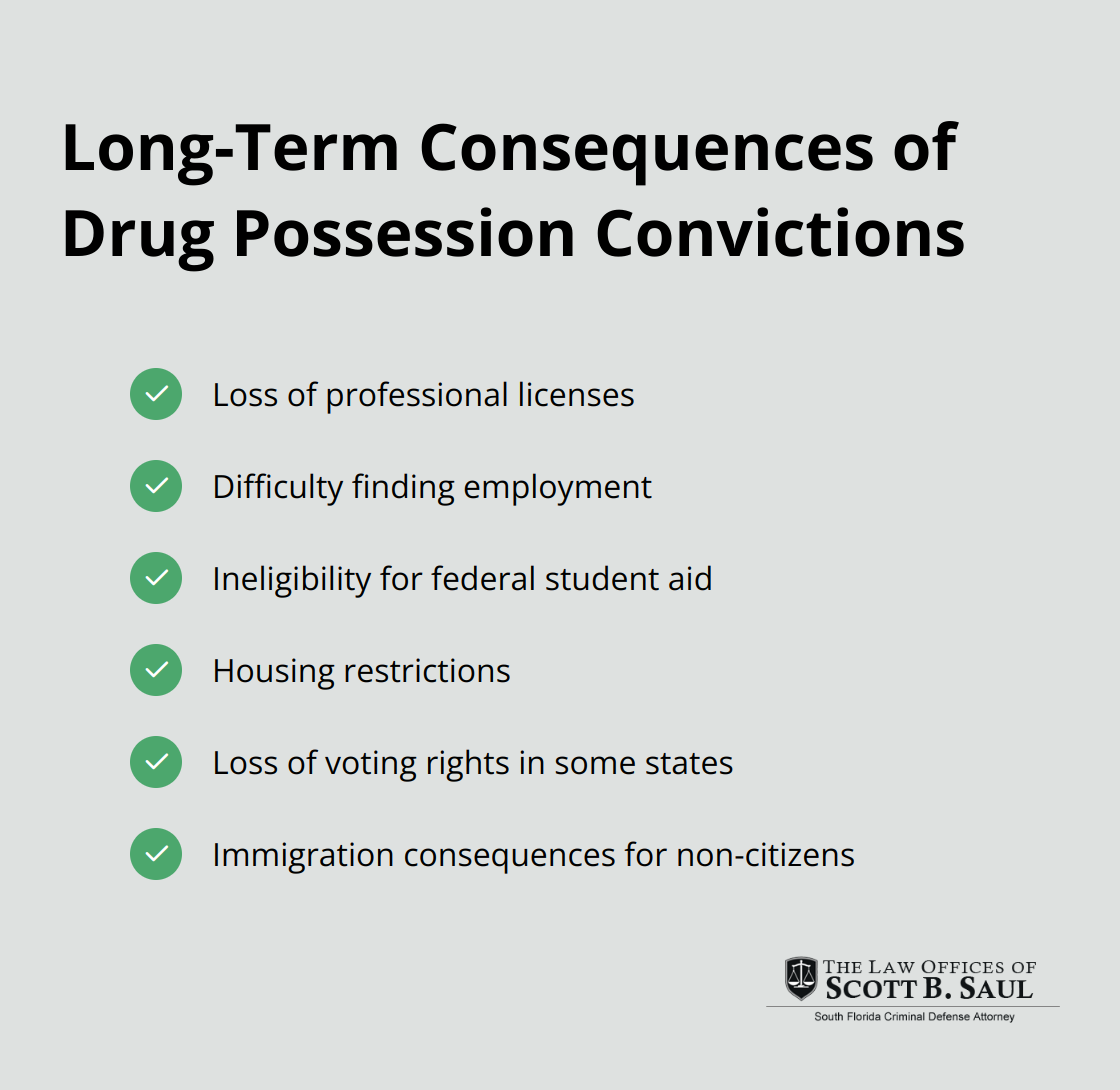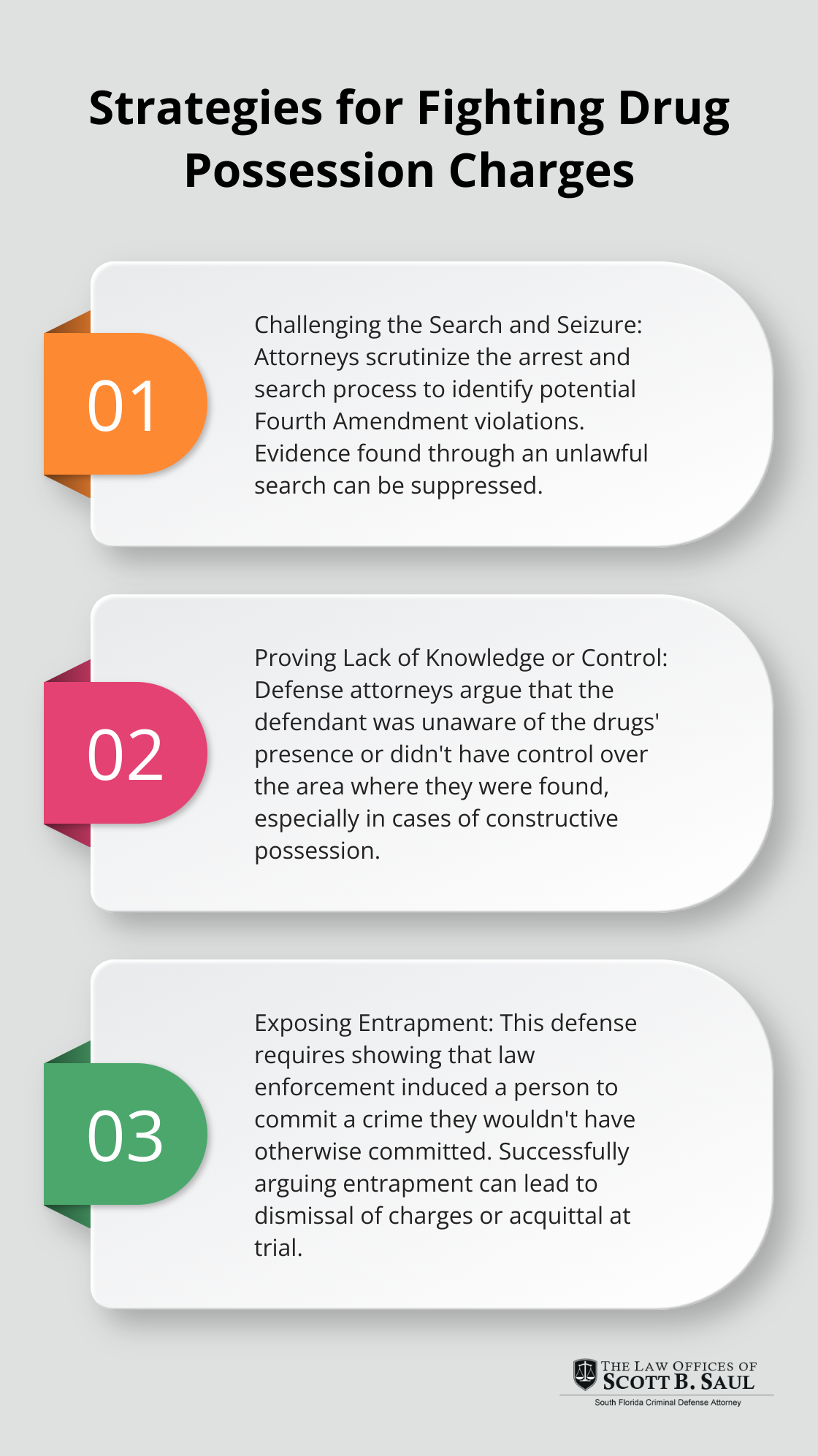Understanding Drug Possession Laws: What You Need to Know
By : saulcrim | Category : Criminal Defense | Comments Off on Understanding Drug Possession Laws: What You Need to Know
2nd Jun 2025

Drug possession laws can be complex and confusing. At Law Offices of Scott B. Saul, we often see clients struggling to understand the charges they face.
This guide breaks down the key aspects of drug possession law, including types of charges, potential penalties, and common defenses. Whether you’re facing charges or simply want to be informed, this information is vital for everyone to know.
Types of Drug Possession Charges
Drug possession laws can be complex and confusing. This section breaks down the key types of drug possession charges, each carrying distinct legal implications.

Simple Possession
Simple possession applies when someone has a small amount of drugs for personal use. The quantity typically suffices for one or a few uses. Simple possession carries penalties of up to 30 years of prison sentence and fines of up to $250,000. Mandatory minimum sentencing may also apply to first-time offenders.
Possession with Intent to Distribute
This charge is more serious than simple possession. Prosecutors levy it when the drug quantity exceeds what’s considered for personal use, or when evidence suggests intent to sell. Signs of distribution often include packaging materials, large amounts of cash, or multiple cell phones. Penalties are much harsher – for example, possessing 28 grams of cocaine with intent to distribute in Florida can lead to a 3-year mandatory minimum sentence.
Constructive Possession
Constructive possession is the legal possession of an object that is not in the person’s direct physical control. For instance, if law enforcement finds drugs in your car or home, you could face constructive possession charges. Prosecutors must prove you knew about the drugs and had control over them. (This type of charge often requires a nuanced defense strategy.)
Possession of Drug Paraphernalia
This charge often accompanies other drug charges. It involves possessing items used to consume, produce, or distribute drugs. Common examples include pipes, syringes, or scales. In Florida, this typically constitutes a first-degree misdemeanor, punishable by up to one year in jail and a $1,000 fine. However, if the paraphernalia relates to methamphetamine production, penalties can increase significantly.
Understanding these distinctions proves essential for anyone facing drug charges. Each type requires a different defense strategy. For instance, challenging the legality of a search might work effectively in a simple possession case, while disputing evidence of intent could be key in an intent to distribute charge.
The consequences of drug possession charges can be severe and long-lasting. (Distribution and trafficking charges are more serious than simple possession.) The next section will explore the potential penalties associated with drug possession convictions in more detail.
What Are the Penalties for Drug Possession?
Drug possession convictions carry severe consequences that impact every aspect of a person’s life. The penalties vary widely depending on factors such as the type and quantity of drug, prior offenses, and jurisdiction.
Fines and Incarceration
Monetary penalties for drug possession can be substantial. In Florida, fines for simple possession of marijuana can reach $1,000 for a first offense. For harder drugs like cocaine or heroin, fines can increase to $5,000 or more. These fines often accompany jail time or imprisonment.
Incarceration periods vary greatly. For example, possession of less than 20 grams of marijuana in Florida is a misdemeanor, punishable by up to one year in jail and a $1,000 fine. However, possession of cocaine can lead to up to five years in prison for a first offense. Repeat offenders face even harsher sentences.
Alternative Sentencing Options
Some jurisdictions offer alternative sentencing for first-time offenders or those with minor drug offenses. These may include:
- Probation: Supervised release with conditions such as regular drug testing and counseling.
- Community service: Mandatory volunteer work in lieu of jail time.
- Drug court programs: Intensive supervision and treatment instead of traditional sentencing.
Long-Term Consequences
The impact of a drug possession conviction extends far beyond fines and potential jail time. Long-term consequences can include:

The American Bar Association has developed the National Inventory of Collateral Consequences of Conviction, a free, online database that identifies collateral consequences of criminal convictions in the U.S. (many of which stem from drug offenses).
Severity Based on Drug Classification
The penalties for drug possession often correlate with the drug’s classification under the Controlled Substances Act. Schedule I drugs like heroin or LSD typically carry the harshest penalties, while lower schedule drugs may result in less severe consequences.
For instance, possession of drugs in Florida can lead to a felony charge, punishable by up to 15 years in prison and a fine of $10,000. In contrast, possession of a Schedule V substance might be classified as a misdemeanor with significantly lighter penalties.
The complexities of drug laws and the severe penalties involved make it essential to have an experienced attorney who can navigate the legal system and work towards the best possible outcome. The next section will explore common defenses against drug possession charges, providing insight into how attorneys challenge these serious allegations.
How to Fight Drug Possession Charges
Drug possession charges can intimidate defendants, but effective defense strategies exist. Experienced attorneys use proven tactics to protect their clients’ rights and challenge these serious allegations.

Challenging the Search and Seizure
The Fourth Amendment protects individuals from unreasonable searches and seizures. Generally, evidence found through an unlawful search can be suppressed. Attorneys scrutinize every detail of the arrest and search process to identify potential violations.
A recent Florida case exemplifies this strategy’s power. A judge threw out drug evidence because a police officer extended a traffic stop without reasonable suspicion (violating the defendant’s Fourth Amendment rights).
Proving Lack of Knowledge or Control
Prosecutors must prove that the defendant knowingly possessed the drugs. This becomes challenging in cases of constructive possession, where drugs weren’t found on the person but in a nearby area.
Defense attorneys argue that the defendant was unaware of the drugs’ presence or didn’t have control over the area where they were found. In a 2022 Miami case, charges were dropped when it was shown that multiple people had access to the car where drugs were discovered (creating reasonable doubt about the defendant’s knowledge and control).
Exposing Entrapment
Entrapment can be a viable defense if law enforcement induced a person to commit a crime they wouldn’t have otherwise committed. This defense requires showing that:
- The idea for the crime originated with law enforcement
- The defendant wasn’t predisposed to commit the offense
The Florida Supreme Court has established clear guidelines for entrapment defenses. Successfully arguing entrapment can lead to dismissal of charges or acquittal at trial.
Asserting Medical Necessity or Valid Prescription
For certain drug charges, particularly those involving prescription medications, a valid defense might be medical necessity or possession of a legitimate prescription. This defense has become increasingly relevant with the expansion of medical marijuana laws.
In Florida, where medical marijuana is legal, patients with valid prescriptions have a strong defense against possession charges for cannabis. However, proper documentation and strict adherence to state regulations regarding quantity and usage are essential.
The Importance of Experienced Legal Representation
Navigating these defenses requires in-depth knowledge of drug laws and court procedures. Early intervention by an experienced criminal defense attorney can significantly impact the outcome of a case, potentially leading to reduced charges, alternative sentencing, or even dismissal of charges.
The Law Offices of Scott B. Saul leverage extensive experience as former prosecutors to anticipate the state’s strategies and build robust defenses for clients. Their track record of over 300 successfully tried jury cases demonstrates their ability to effectively challenge drug possession charges and protect clients’ rights.
Final Thoughts
Drug possession law encompasses complex legal concepts with severe consequences for offenders. The penalties range from fines to imprisonment and can impact various aspects of life long after the case concludes. Different types of possession charges require specific defense strategies, making professional legal representation essential in these cases.
Effective defense tactics exist to challenge drug possession charges. Attorneys can question search legality, prove lack of knowledge, or argue entrapment to protect their clients’ rights. At Law Offices of Scott B. Saul, we use our experience to build strong defenses for our clients facing drug possession charges.
If you face drug possession charges, take immediate action. Exercise your right to remain silent and contact an experienced attorney promptly. Avoid discussing your case with anyone except your lawyer and preserve any relevant evidence. Early legal intervention can significantly influence your case outcome and help protect your future.
Archives
- February 2026 (5)
- January 2026 (9)
- December 2025 (9)
- November 2025 (8)
- October 2025 (8)
- September 2025 (9)
- August 2025 (8)
- July 2025 (8)
- June 2025 (9)
- May 2025 (9)
- April 2025 (8)
- March 2025 (9)
- February 2025 (8)
- January 2025 (9)
- December 2024 (10)
- November 2024 (5)
- July 2024 (2)
- June 2024 (2)
- May 2024 (2)
- April 2024 (2)
- March 2024 (2)
- February 2024 (2)
- January 2024 (2)
- December 2023 (2)
- November 2023 (2)
- October 2023 (2)
- September 2023 (2)
- August 2023 (1)
- July 2023 (2)
- June 2023 (2)
- May 2023 (2)
- April 2023 (2)
- March 2023 (2)
- February 2023 (2)
- January 2023 (2)
- December 2022 (2)
- November 2022 (2)
- October 2022 (2)
- September 2022 (2)
- August 2022 (2)
- July 2022 (2)
- June 2022 (2)
- May 2022 (2)
- April 2022 (2)
- March 2022 (2)
- February 2022 (2)
- January 2022 (2)
- December 2021 (2)
- November 2021 (2)
- October 2021 (2)
- September 2021 (2)
- August 2021 (2)
- July 2021 (2)
- June 2021 (2)
- May 2021 (2)
- April 2021 (2)
- September 2020 (5)
- July 2020 (4)
- June 2020 (4)
- May 2020 (4)
- April 2020 (5)
- March 2020 (4)
- February 2020 (4)
- January 2020 (4)
- December 2019 (1)
- November 2019 (4)
- October 2019 (4)
- September 2019 (4)
- August 2019 (4)
- July 2019 (5)
- June 2019 (4)
- May 2019 (4)
- April 2019 (4)
- March 2019 (4)
- February 2019 (4)
- January 2019 (4)
- December 2018 (4)
- November 2018 (5)
- October 2018 (5)
- September 2018 (4)
- August 2018 (4)
- July 2018 (7)
- June 2018 (4)
- May 2018 (4)
- April 2018 (8)
- March 2018 (4)
- February 2018 (4)
- January 2018 (4)
- November 2017 (4)
- October 2017 (4)
- September 2017 (4)
- August 2017 (7)
- July 2017 (6)
- June 2017 (4)
- May 2017 (4)
- April 2017 (4)
- March 2017 (4)
- February 2017 (7)
- January 2017 (4)
- December 2016 (7)
- November 2016 (4)
- October 2016 (4)
- September 2016 (10)
- August 2016 (4)
- July 2016 (4)
- June 2016 (4)
- May 2016 (4)
- April 2016 (4)
- March 2016 (4)
- February 2016 (7)
- January 2016 (4)
- December 2015 (5)
- November 2015 (4)
- October 2015 (7)
- September 2015 (4)
- August 2015 (4)
- July 2015 (13)
- June 2015 (9)
- May 2015 (8)
- April 2015 (6)
- March 2015 (4)
- February 2015 (4)
- January 2015 (4)
- December 2014 (4)
- November 2014 (4)
- October 2014 (4)
- September 2014 (3)
Categories
- Adjudication (1)
- Bankruptcy (1)
- Burglary Crimes (3)
- calendar call (1)
- Car Accident (1)
- Criminal Defense (395)
- Cyber Crimes (7)
- DNA (1)
- Domestic Violence (9)
- Drug Crimes (5)
- DUI (12)
- Embezzlement (1)
- Environmental Crimes (4)
- Expungement Law (2)
- Federal Sentencing Law (3)
- Firearm (3)
- Forgery (4)
- General (82)
- Healthcare (3)
- Immigration (1)
- Indentity Theft (1)
- Insurance (5)
- judicial sounding (2)
- Juvenile Crimes (4)
- Manslaughter (4)
- Money Laundering (3)
- Organized Crime (1)
- Racketeering (1)
- Reckless Driving (3)
- RICO (3)
- Sealing and Expunging (2)
- Sex Offense (1)
- Shoplifting (1)
- Suspended Driver's License (1)
- Traffic (4)
- Trending Topics (1)
- White-collar Offenses (1)

